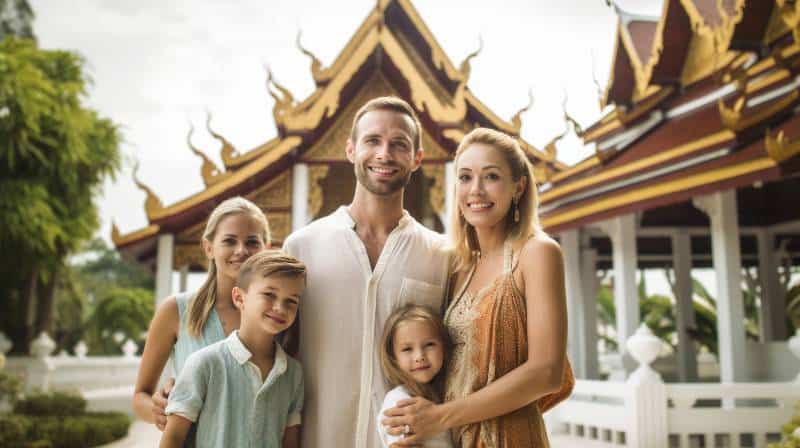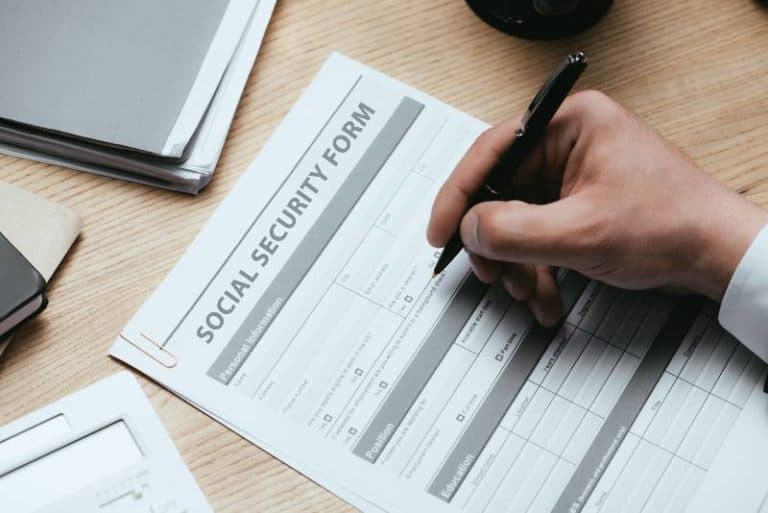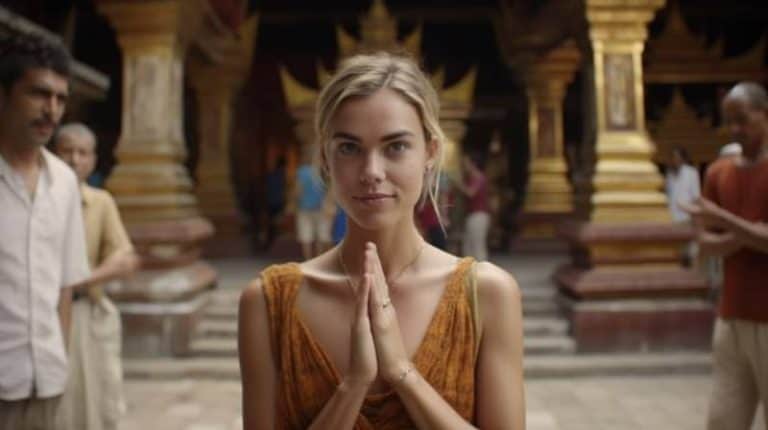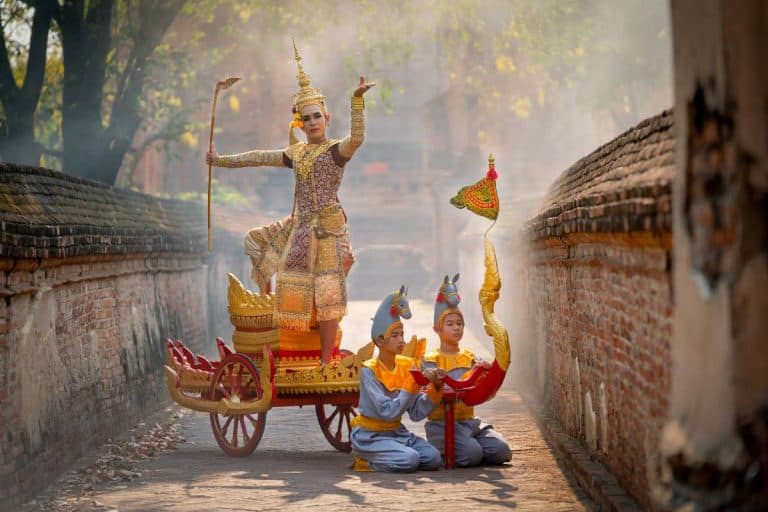Embrace Thai Culture: Celebrate Holidays like a Local
Are you looking to experience Thai holidays and traditions like a local? From Songkran (Thai New Year) celebrated with water fights in the streets, to Loy Krathong where locals release floating lanterns into the night sky each November, intricate holiday customs are an essential part of life in Thailand. Get ready to explore this fascinating culture as we dive deep into some of Thailand’s most popular celebrations—here’s how you can take part and get the full traditional experience.
To celebrate Thai holidays like a local, immerse yourself in the traditions and customs. Join water fights during Songkran, make and float a krathong for Loy Krathong, and participate in candlelit processions for Visakha Bucha. Respect the culture, show sensitivity, and explore lesser-known festivals for an authentic experience.
Key Takeaways
- To experience Thai holidays like a native, it’s crucial to fully engage in their rich traditions and customs. You can get involved in water fights to celebrate Songkran, construct and set afloat a Krathong during Loy Krathong, or join candlelit processions in honor of Visakha Bucha.
- To show respect and cultural sensitivity when celebrating Thai holidays, make sure to learn about the customs, etiquette, and rules related to each holiday.
- Although many people are familiar with famous Thai festivals like Songkran and Loy Krathong, it’s worth considering exploring some of the lesser-known celebrations.
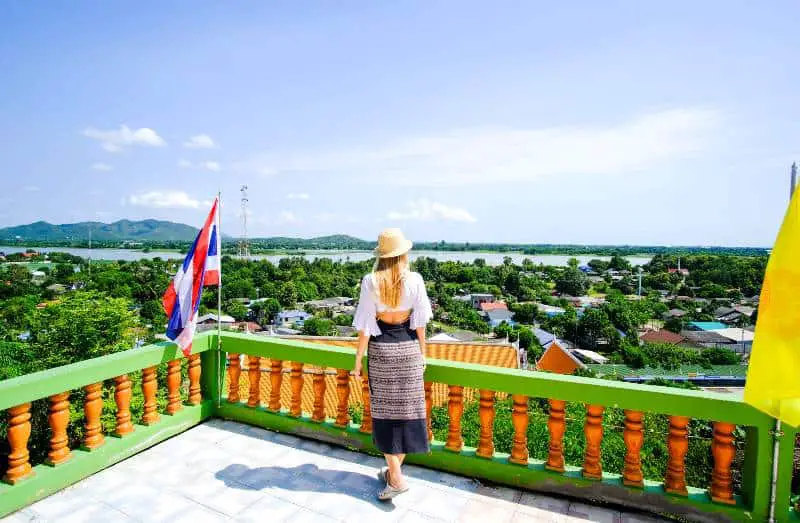
Thai New Year (Songkran)
In Thailand, Songkran is one of the most important Thai holidays, It’s also considered one of the national holidays and is considered one of the major events in Thailand, and the water fight that takes place from April 13th to 15th, coinciding with the hottest time of the year. This celebration marks the start of a new solar year and symbolizes renewal and rebirth. It is one of the most famous festivals worldwide, drawing in a large number of people.
The term “Songkran” originates from the Sanskrit language and refers to the movement of the sun from one Zodiac sign to another. Previously determined through astrology, it is now consistently held on 13 April. During this holiday, the country shuts down and concentrates on the ceremonies and customs linked with the festival.
For Buddhists, Songkran is a significant occasion, and they often travel to various temples across the country to mark it. They pour water on Buddha statues and the hands of monks to show reverence. During this festival, numerous natives go back to their hometowns to meet their dear ones.
It is customary to do a deep cleaning of the home to renew its energy on the first day of the festival. Additionally, numerous cities have grand processions and parades featuring statues and pictures of the Buddha.
On the 15th day of the festival, which is the third day, people leave offerings at the temples and there are final celebrations held in cities all over Thailand. During the entire three-day festival, people can be seen celebrating in the streets, enjoying performances, and splashing water on each other.
Songkran has become a popular event for tourists in recent years. Many travelers and backpackers visit the country to participate. During the celebration, tens of thousands of people join the festivities by drenching each other with cold water on the streets to welcome the new year.
Makha Bucha
Makha Bucha is a revered holiday in Thailand that takes place in the third lunar month and commemorates a pivotal moment in Buddhist history. On the night of the full moon, people come together to honor the wisdom and teachings of the Buddha, which were imparted to over 1200 disciples during this exact time centuries ago.
The holiday holds a special place in Thai culture and is filled with vibrant celebrations and religious ceremonies. It’s a time to reflect on the importance of mindfulness, compassion, and respect – values that are at the heart of Buddhist teachings. So mark your calendars for Feb 7th and join the festivities!
Visakha Puja
Visakha Puja is a significant religious holiday observed by Buddhists worldwide, especially in Thailand. Also known as ‘Buddha’s Birthday,’ the holiday commemorates three major events in the life of Buddha, namely his birth, enlightenment, and death. The celebrations involve performing meritorious deeds, such as making offerings, chanting, and giving alms to monks, among other activities.
Visakha Puja is an opportunity to reflect on Buddha’s teachings and imbibe his wisdom to lead a compassionate and mindful life. Whether you’re a follower of Buddhism or curious about the religion, Visakha Puja is a wonderful occasion to immerse in its spirituality and culture.
Loy Krathong
Loy Krathong is a beautiful festival in Bangkok where people gather near lakes, rivers, and canals to pay homage to the water goddess. They release exquisite lotus-shaped rafts decorated with candles, incense, and flowers onto the water to celebrate the occasion.
The Loy Krathong festival happens every year on the night of the 12th lunar month, typically in November. It marks the end of the rainy season and coincides with a bright full moon. During the festival, thousands of krathongs are floated on the water, each carrying a candle that creates a beautiful sight. If you’re in Bangkok, there are many places where you can join in the celebrations.
The festival has a complex history and Thais celebrate it for various reasons. It marks the end of the main rice harvest season and is a time to show gratitude to the Water Goddess for providing abundant water throughout the year. It is also a time to seek forgiveness for polluting the waters.
During this time, it is believed that you can release any anger or resentment you’ve been holding onto by floating a Krathong. Adding a fingernail or a lock of hair can represent letting go of a negative aspect of yourself and starting fresh. If your candle remains lit until your Krathong is out of sight, it is thought to bring good luck for the year.
In Thailand, people usually release their krathong in rivers or small canals known as “klongs.” However, nowadays, it is acceptable to release them in ponds or lakes. Additionally, many locations hold cultural events, including Ram Wong dance shows, krathong-making contests, and beauty pageants.
Although people in Bangkok are releasing lanterns, this is just a small part of the festival. For the complete lantern experience, you should head up to Chiang Mai for the Yee Peng festival. However, people also frequently fly lanterns in Phuket and Samui.
Visakha Bucha
Thailand’s most significant Buddhist holiday is Visakha Bucha Day, which is celebrated to commemorate three important events in the life of the Lord Buddha. All these events took place on the full-moon day of the sixth lunar month (known as the Visakha month).
The Visakha full moon is a significant day that marks three important events in Buddha’s life. These events include his birth, enlightenment after 35 years, and his entry into Nirvana after 45 years. The picture shared below shows the renowned Reclining Buddha statue at Wat Pho in Bangkok, which portrays Buddha’s entry into Nirvana.
In Thailand, Visakha Bucha Day is a public holiday that occurs in May or June depending on the lunar calendar. On this day, Thai Buddhists typically visit their nearby temple to make merit. As it holds significant importance in Buddhism, alcohol sales are restricted, leading to the closure of some bars and clubs for the day.
Thai Royal Ploughing Ceremony
The Thai Royal Ploughing Ceremony is a long-standing holiday in Thailand that honors the country’s agricultural history. The Bureau of the Royal Household is responsible for choosing the date of the ceremony, which is determined through astrological observations. Known by several names, including Farmer’s Day and Wan Phuet Mongkhon, this celebration commemorates the traditional practices of planting and harvesting crops. Along with Cambodia and Myanmar, Thailand has maintained this age-old tradition as a way of paying homage to the vital role that farming has played in their culture.
King’s Birthday (Thai National Father’s Day)
In the Kingdom of Thailand, December 5th is a significant day. It has been recognized by the Royal Thai Government as the National Day of the country and also serves as a tribute to the Birthday Anniversary of His Majesty the late King Bhumibol Adulyadej. Furthermore, it is celebrated as Thailand’s Father’s Day.
Rama IX was the longest-reigning monarch in Thailand’s history, ruling from 9 June 1946 until his death on 13 October 2016. Although he was a constitutional monarch and had no legal authority in the political arena, he played a crucial role in Thailand’s transition to democracy in the 1990s and made several significant interventions in the country’s political affairs.
The current king, also known as King Rama X, is Vajiralongkorn. He became king in 2016 after his father passed away. He continues to commemorate the national day of the country on the same date as his father’s birthday.
The national day of Thailand was originally celebrated on June 24 as a commemoration of the transition from absolute monarchy to constitutional monarchy in 1932. However, on May 21, 1960, Prime Minister Field Marshal Sarit Thanarat changed the date to honor the birthday of the King of Thailand.
The reason for the change is that Thailand has noticed that many monarchies worldwide, like England, Japan, Sweden, and others, celebrate their national days on their monarch’s birthdays. Thus, Thailand decided to adopt the birthday of His Majesty the King, which occurs on December 5th every year since 1960, as their “National Day.”
In Thailand, the holiday is celebrated with colorful decorations. Buildings will be adorned with flags, bunting, and portraits of the late King, while the streets around the Grand Palace area of Bangkok will be decorated with thousands of marigolds.
When you’re planning a trip to Thailand, there are numerous things that you must know to ensure an amazing experience. One of the key aspects is to truly embrace the rich Thai culture. Immerse yourself in the local way of life by celebrating holidays like a local. Learn about their customs, traditions, and festivities to gain a deeper understanding of the vibrant Thai culture. For more insights on how to make the most of your visit, read our comprehensive guide here.
Vegetarian Festival
The Phuket Vegetarian Festival occurs once a year in September or October, on the 9th lunar month of the Chinese calendar. It is a celebration of the Chinese community’s belief in abstaining from meat and certain stimulants for better health and peace of mind. The festival is known for its colorful traditions.
The festival is well-known for its intense celebrations, which involve rituals such as firewalking and body piercing to venerate the gods. The participants who act as the gods’ vessels engage in self-mortification, with increasingly bold and astonishing performances each year.
The Phuket Vegetarian Festival’s history is not definitive, but it is believed to have been introduced to the island by a Chinese opera troupe that became ill during a malaria outbreak. To request the Nine Emperor Gods (also called the Kiu Ong Iah) to come to Phuket, one of the artists was dispatched to China.
The tradition in China involves abstaining from meat, alcohol, sex, quarreling, lying, or killing to purify the mind and body. The opera group observed this tradition and fully recovered, which ended the epidemic. As a result, the people of Phuket continue to celebrate the festival.
The festival originated as a tribute to the gods and to celebrate the community’s triumph over a deadly disease during the 19th century. Over time, it has evolved into a breathtaking annual occasion in Phuket that attracts numerous tourists, particularly from China and other Asian locations.
Phi Ta Khon (Ghost Festival)
The Phi Ta Khon Festival, also known as the Ghost Festival of Thailand, has ancient roots. Legend has it that when Prince Vessantara (Buddha in a previous life) went on a long journey, many of his followers thought he had died. However, he eventually returned alive and well, much to the delight of his followers. The celebrations that ensued were so noisy that they woke the dead.
The celebrations for Phi Ta Khon have continued over time. This festival has evolved to become one of the most enjoyable celebrations in Thailand, also known as the land of smiles, and an essential part of Bun Pawet, which is a Buddhist merit-making festival.
During the three-day festival in Dan Sai district, Loei province, townspeople celebrate by wearing ghost masks – which is the festival’s name in English – and participating in parties and parades. People get creative with their masks, which are handcrafted from dried sticky husks and typically have long noses. The masks are a colorful and vibrant sight, sometimes even scary.
Songkran Festival (Phra Pradaeng)
Songkran Phra Pradaeng is a unique and vibrant celebration of the Thai New Year held in Phra Pradaeng, a district located in the province of Samut Prakan, Thailand. Songkran, also known as the Water Festival, is one of the most important festivals in Thailand, and it is widely celebrated throughout the country.
Phra Pradaeng is renowned for hosting one of the most lively and traditional Songkran festivities in Thailand. The festival typically takes place from April 13th to 15th, marking the transition from the old year to the new year according to the Thai lunar calendar. However, it’s important to note that specific details about the festival may vary from year to year, so it’s always a good idea to check for the latest information if you plan to attend.
During Songkran Phra Pradaeng, the local community comes together to engage in various traditional activities and rituals.
One of the main highlights of the festival is the vibrant water fights that take place on the streets. People armed with water guns, buckets, and other water-spraying devices playfully drench each other in water as a symbol of cleansing and renewal for the upcoming year. It’s a joyful and exuberant celebration that allows participants to cool off from the scorching April heat.
In addition to the water fights, you can also witness cultural performances, traditional music and dance, and religious ceremonies during Songkran Phra Pradaeng. The locals often dress in traditional Thai costumes, and you’ll find beautifully decorated floats parading through the streets.
Furthermore, the festival offers a chance to experience the rich culinary traditions of Thailand. Food stalls line the streets, offering a wide array of delicious Thai dishes and snacks for visitors to enjoy.
If you plan to attend Songkran Phra Pradaeng, it’s advisable to dress appropriately, as you will likely get wet. Wearing lightweight clothes and bringing a change of clothes is a good idea. It’s also recommended to protect your valuables and electronics from getting soaked during the water fights.
If you’re planning a trip to Thailand, you should definitely read an article that I wrote on holidays and culture there. You’ll get great insights into the vibrant traditions and fascinating history of this incredible country, as well as tips on how to make the most of your adventure. Go ahead and check it out!
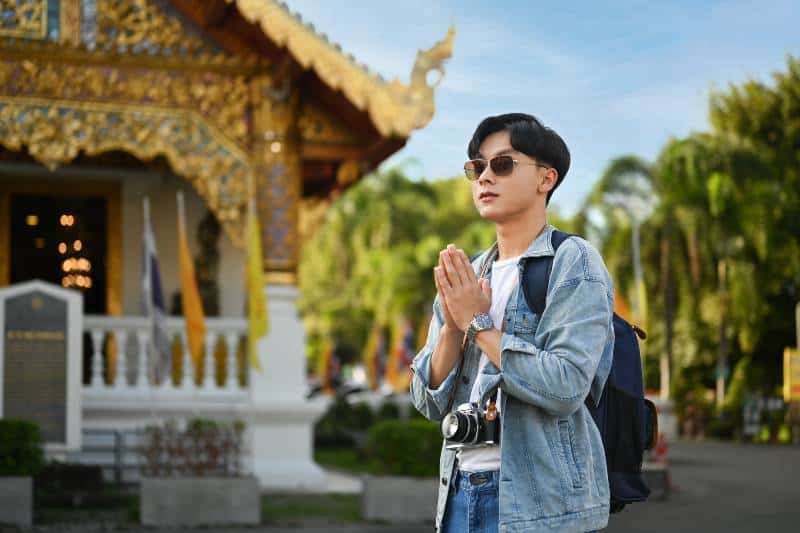
How to celebrate Thai holidays like a local FAQs
What is the Thai Royal Ploughing Ceremony, and how can I witness it?
Every year, there is a ceremony held at Sanam Luang where two steers are invited to plow the land surrounding the area. During this ceremony, seeds (má-lét) are thrown around while the steers are plowing. Additionally, the cows are fed food and drink including beans, rice, corn, sesame, grass, water, and liquor.
How do Thai people celebrate King’s Birthday, and how can I show my respect?
In Thailand, it is important to show great respect towards the monarchy. It is considered a criminal offense to speak ill of the Royal family. Additionally, it is advised not to step on coins or lick stamps in public as they feature images of the King.
What is the Vegetarian Festival in Thailand, and how can I participate?
The Jae Festival is a nine-day vegetarian food festival celebrated in Thailand, also known as the Thai Vegetarian Festival or the Nine Emperor Gods Festival. It is a stricter form of vegetarianism than regular veganism or vegetarianism.
What is Phi Ta Khon (Ghost Festival), and how can I experience it firsthand?
During the three-day festival, people in the Dan Sai district of the Loei province celebrate by wearing ghost masks, which is also the meaning behind the festival name. The festivities include parties and parades.
What makes the Songkran Festival in Phra Pradaeng unique?
The Phra Pradaeng Songkran celebration includes various events such as lively parades, a beauty contest, releasing birds and fish, showcasing performing arts, and presenting traditional Mon performances.
Conclusion
By getting involved in the holidays that Thailand has to offer, you can experience Thailand as a local would. Whether it’s taking part in water fights for Songkran, constructing a krathong for Loy Krathong, or joining candlelit processions for Visakha Bucha, respecting and recognizing the unique customs and traditions of each holiday allows for a more fulfilling experience and greater cultural understanding.
Don’t forget about some of the more unknown celebrations that occur throughout the year! Explore these underrated festivals for a deeper connection with Thai culture. Now that you have a better knowledge of what celebrating Thai holidays is like, why not pack your bags and go?
If we left anything out don’t hesitate to contact us! We’re always happy to answer any questions you may have related to traveling around Thailand or living abroad long-term. Subscribe to our newsletter for more information about living and traveling in Thailand and join us on an adventure through this unique country.
